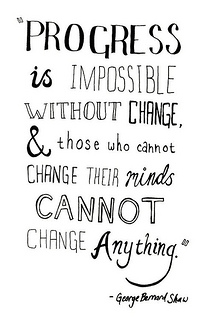
 Have you ever tried shifting a steadfast object? A tree trunk that spoils the lines of your front lawn, permanent black marker accidently applied to a white board or maybe a person who is determined to achieve their objectives?
Have you ever tried shifting a steadfast object? A tree trunk that spoils the lines of your front lawn, permanent black marker accidently applied to a white board or maybe a person who is determined to achieve their objectives?
The tree trunk can be removed with time, effort and determination. The process will likely create a lot of mess and will leave an indelible mark in the lawn for a few seasons, but, eventually the mark will blend into the rest of the lawn and the unwanted tree trunk will become a distant memory.
I’ve seen first-hand the results of efforts at removing permanent marker from a white board. The board had been scrubbed until the ink faded, but, the words were still there. The room monitor was frustrated at the effort involved and also at the person who had carelessly applied the ink. There was now bad feeling between the two. Eventually the room monitor gave in and just painted over the marks with white paint! It seems this was the lesser of two evils, but in the end, a mark of sorts still remained.
And what of the determined person? The one who has a very clear goal in mind and is determined to achieve the outcome no matter the price? Also, let’s assume for this purpose that the goal is positive and has been well-considered. In the longer term success will result in a  life improvement for the goal-maker and is also likely to have a positive impact on those around him/her. Some goals of this nature might be:
life improvement for the goal-maker and is also likely to have a positive impact on those around him/her. Some goals of this nature might be:
- To actively pursue a promotion at work or to set up his/her own business
- To lose weight by following specific diet guidelines
- To improve fitness by joining a gym or signing up to a fitness challenge (eg, run a marathon)
- To leave home and set up independently
- To work towards financial independence/early retirement
- To study for a degree or learn a new language
- To improve confidence and assertiveness
It’s human nature to want to maintain the status quo, to stay within our comfort zone and this includes maintaining our relationships in the way we are accustomed. Inevitably, if one of these relationships begins to alter because the other person has decided to make a change, then it is going to cause changes to the relationship.
In these circumstances, whilst we might like to think of ourselves as supportive, we may actually feel a little uncomfortable with the new direction our relationship is moving in. As a consequence we may unconsciously try to put things back the way they were. In other words, we might think (believe) we are actually helping, but in fact, our actions are in contrast with those beliefs. For example we might
- Make a favourite (but high calorie) dinner
- Offer up lots of reasons why it might not work
- Complain about the lack of attention
- Sulk, whine, stop talking or be argumentative
- Place unreasonable expectations on the other person
- Be unduly worried
We probably wouldn’t mean to cause the other person difficulties in their chosen path, but, predictably, when someone makes a change,  things around them also begin to change. This of course can have a positive or negative impact on the relationship and as the ‘supporter’, it is our job to recognise the possible changes and to consciously decide if we’re happy with this new type of relationship.
things around them also begin to change. This of course can have a positive or negative impact on the relationship and as the ‘supporter’, it is our job to recognise the possible changes and to consciously decide if we’re happy with this new type of relationship.
It’s important to actively do this: to consider how things are changing and how things are likely to look in the future because we may genuinely be concerned about how these changed activities affect our lives now and, more importantly, how they will affect us in the longer term.
Let’s take a couple of the examples given above and consider the possible short and long term effects.
To actively pursue a promotion at work or to set up his/her own business
The goal-maker has decided that they want to work towards the next promotion or that they are going to set up their own business. They’ve considered what will be needed in order to achieve this goal in terms of the extra work in learning new skills and developing an appropriate network.
In real terms this means that the goal-maker is likely to spend more time away from home or stacked up in their home office, diligently working towards their objective. They will be more tired than usual and quite possibly a little stressed and irritable at times.
For those around the goal-maker, be it the partner, parents or friends the short term outward manifestations of this goal will likely be: less time with the person and when there is time they may be distracted and tired.
In the long term, success is likely to lead to improved finances and therefore an improved standard of living. There may still be demands on the goal-maker’s time and periods of stress. However, the successful outcome should also bring a positive sense of achievement to the goal-maker which may result in greater happiness.
To improve confidence or assertiveness
The goal-maker has decided it is time to deal with their lack of confidence and/or lack of assertiveness. To pursue this goal has been a difficult decision to make as it has required confidence and a belief that they are worthy or the effort. The goal feels ‘shaky’ to them and they could easily be deterred from progress.
This time the goal-maker might be attending a course or reading self-help books on the subject. In the progress of this work, he/she will be attempting to implement the new skills (s)he’s learned. These initial attempts might be clumsy and appear aggressive. They will almost certainly appear to be ‘out of character’.
As the ‘supporter’ this is potentially going to be a difficult period of change as we may baulk at the ‘new’ opinions and attitudes being presented by our partner/friend.
Hopefully you can see from these examples that taking time to consider the impact on ourselves is worthy of some thought and consideration. The insights this process gives us will help us to remain (as far as possible) objective about the changes. It will also give us a considered foundation for any conversations that we feel may be necessary with the goal-maker as time passes and changes come about. This may sound a little self-interested, and it is, because we may not always be happy about the changes, so a little foresight can help us deal with the changes if we choose to.
It’s often difficult to see our part in contributing to another’s successful or difficult progress towards their goals as quite often we will be entrenched in ‘reactive mode’. And, if, as you read this you are already thinking “Well what about me?”, then this might be the time to take a step back and take a dispassionate examination of the situation.
A determined person doesn’t find it hard to succeed; they find it hard to stop trying.
— Allen Steble
In the end, if someone has decided to make some kind of change and they are determined to realise their desired outcome, placing obstacles in their path is unlikely to change their plan. Sooner or later they will find a way around the obstacle and continue on their journey. In the meantime, we may have caused damage to the relationship by being unintentionally awkward.
The message that I hope I’ve conveyed via this post is that we don’t have to be ‘victims’ of changes that are happening around us. With a little forethought and a considered response, we may be able to ease the period of transition for ourselves whilst remaining supportive of the goal-maker, and if, in the longer term we can see the benefits of the change, then dealing with the short-term ramifications will be easier.
Remember, it’s in your gift to consciously choose to help take up the tree stump or just paint over the black marker. Choose wisely.
Photos: Twentyfour Students , Arya Ziai , Rance Costa




Thank you for an excellent post… Lots of food for thought there for me. I’m ‘looking to be ‘ the ‘goal maker’ and will ensure I’m mindful of the effect on others that will be affected/involved!
This post couldn’t have come at a better time :0)
Thanks Ceryl! It’s so good to know I’m ‘hitting the right note’ 🙂
I’m curious to know what your goals are going to be…will you be sharing them with us? 😉 Whatever they are, I’m sure it’s going to be an exciting and successful 2015!
Go make it so!